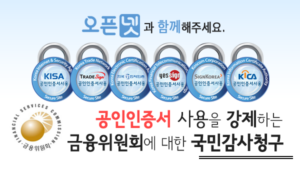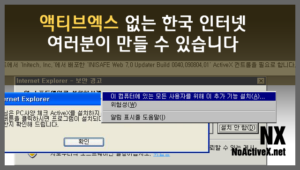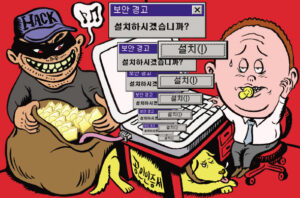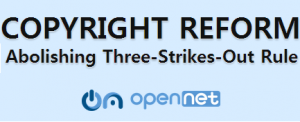Press Release
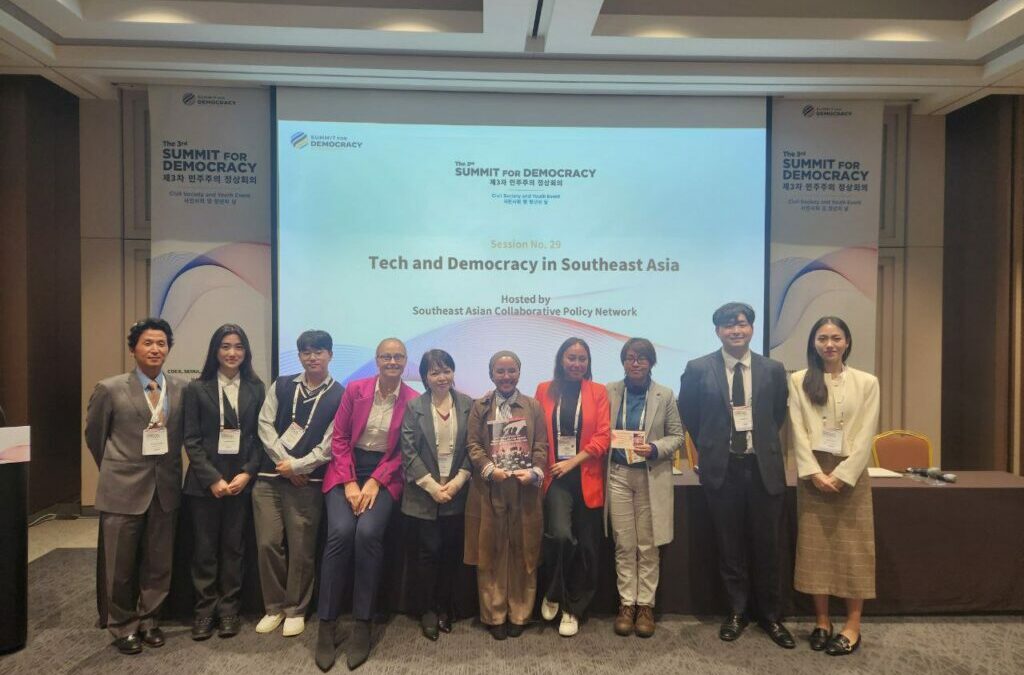
The 3rd Summit for Democracy: Tech and Democracy & Digital Authoritarianism in Southeast Asia
Open Net held a workshop titled "Tech and Democracy in Southeast Asia", March 19, 2024, 4:30 pm to...
Open Net Korea leads discussions on AI Digital Textbooks and Southeast Asian Democracy at the Summit for Democracy with Korean law students and regional activists
<Privacy and Surveillance Issues in AI Digital Textbook Policy>- Date & Time: March 19...
[Press Briefing] On the Violation of the Freedom of Expression in South Korea
Date & Time: Thursday, March 14, 2024, 2:30 PM Venue: Seoul Foreign Correspondents’...
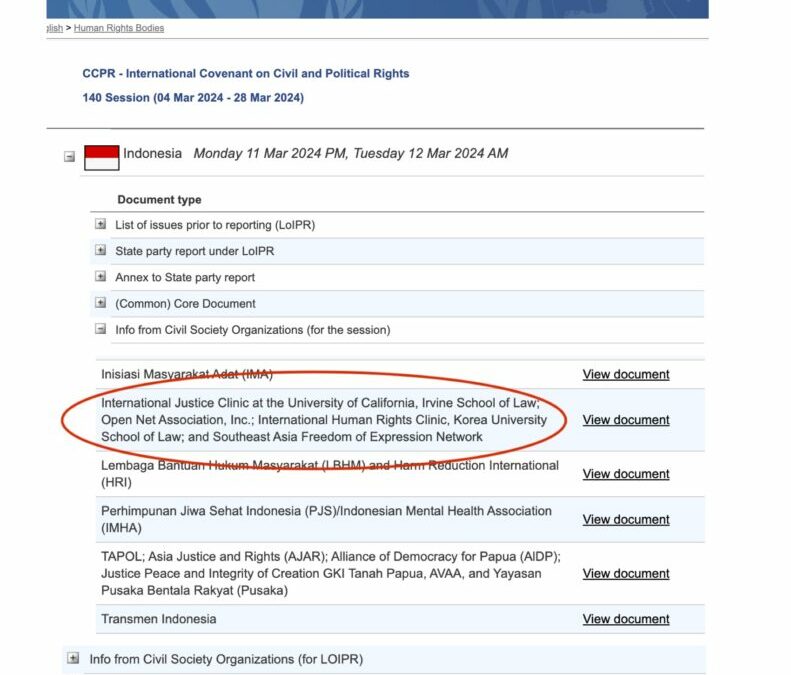
Open Net publishes a shadow report on Indonesia digital rights to UN Human Rights Committee
On February 6, 2024, Open Net, in collaboration with Southeast Asian Freedom of Expression...
The world’s most bizarre court decision: Louis Vuitton’s trademark lawsuit infringing upon consumers’ right to enjoy culture
Louis Vuitton has won its first round of trademark infringement lawsuits against small repair...
LITIGATION
No Results Found
The page you requested could not be found. Try refining your search, or use the navigation above to locate the post.
OPEN SEMINAR
November 7, 2019 Special Seminar on Reforming Interconnection Rules
Toward Free and Fair Internet Ecosystem: Special Seminar on Reforming Interconnection Rules ...
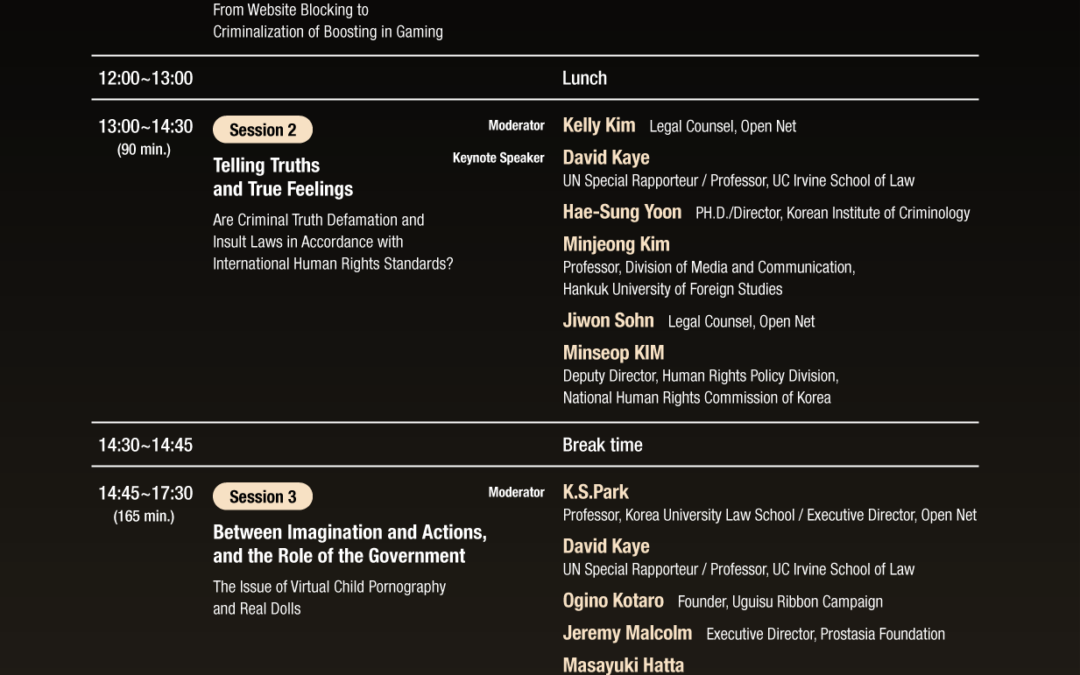
Open Net Hosts ‘The Current Status of Freedom of Expression in the Republic of Korea’ Conference with Special Host David Kaye, the UN Special Rapporteur on Freedom of Expression
Open Net will be hosting a conference with special host David Kaye, the UN Special Rapporteur on...
Open Net Co-Hosts “State Surveillance in the Korean Society and Privacy Protection in the Digital Age,” a Seminar with Mr. Joseph Cannataci, UN Special Rapporteur on the Right to Privacy
Please read the Korean original here.
NGOs to Host Press Conference Before the UN Special Rapporteur on the Right to Privacy’s Visit to Korea
Please read the Korean original here. NGO Report on the Right to Privacy in the Republic of...
Open Net Hosts Sessions on Net Neutrality and Open Data Analysis at KrIGF 2019
Please read the Korean original here.
COURT ACTIONS
No Results Found
The page you requested could not be found. Try refining your search, or use the navigation above to locate the post.
education
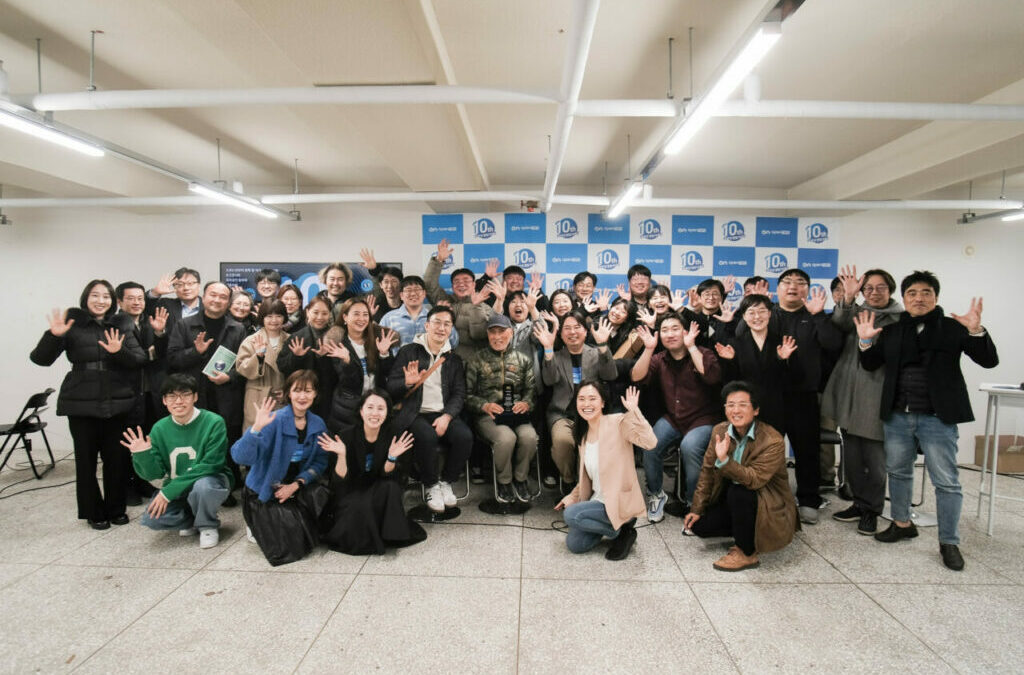
Open Net Korea Annual Report 2024
<Open Net 10th Anniversary Celebration> [Legislative Policy Activities] ❏ [Domestic] Freedom...
[Joint Statement] We express deep regret over the Constitutional Court’s decision to condone widespread privacy violations such as the collection of base station information during the COVID-19 period
see https://www.opennet.or.kr/24830
OpenNet Submits Supporting Opinion for the Bills Limiting Factual Defamation to Privacy Invasions
On September 6, 2024, Open Net submitted supporting opinions to the National Assembly regarding...
Submitted opposition to the Information Disclosure Act amendment that restricts the right to request information disclosure based on arbitrary judgments
see https://www.opennet.or.kr/25408
[Joint Statement] The “Ryu Hee-rim Impeachment Act” Inappropriate in Both Its Direction and Procedure
On July 13, South Korea’s Democratic Party unilaterally passed a bill in the National Assembly’s...
POLICY RESEARCH
Open Net Forum on “Right to be Forgotten”
Please read the Korean original here.
Open Net held Forum on “History of Opposition movement against Compulsory Personal Identification Number system”
Please read the Korean original here.
Open Net to hold seminar on Freedom from Censorship and Surveillance and Freedom of Global movement of Data on April 24th.
Please read the Korean original here.
![[Open Net forum] Anupam Chander, “Freedom from Censorship and Surveillance, Freedom of Data Cross-border Movement”](https://old.opennetkorea.org/en/wp/wp-content/uploads/2014/04/140313_2p01_web1.jpg)
[Open Net forum] Anupam Chander, “Freedom from Censorship and Surveillance, Freedom of Data Cross-border Movement”
Freedom from Surveillance and Censorship Hosted by Open Net Sponsored by Korea Internet...
Open Net holds a Seminar with MP Choi Jae-Chun on Search Engine Regulations and State’s Role
Read Korean original here.
CAMPAIGN
Stop Internet Censoring
We have seen many attempts to censor the Internet under the pretext of copyright protection. Notorious attempts are SOPA and PIPA of 2012, which triggered the largest online protest in history and was eventually withdrawn, and ACTA, a plurilateral trade deal killed by the European Parliament in 2012. Now, Korean government tries to enact a much stronger internet censoring rule. If it passes the legislative body, a copyright protection agency may cut off access to websites that the agency views as copyright infringing. The concerns over mass surveillance and privacy vulnerabilities by the proposed rule are widespread amid the government’s new drive to block “https” traffic by SNI eavesdropping (See, press release of Korea Communication Commission on February 12, 2019 and press release of MCST on May 2, 2018, both in Korean).
Intermediary Liability Campaign
Korean law (Copyright Act Article 103, Information Communication Network Act Article 44-2) requires intermediaries to take down all content for which anyone sends a takedown notice, regardless whether the content violates any right or law, not as a condition of qualifying for a safe harbor but as a positive obligation. As a result of this ‘mandatory’ notice-and-takedown system, the intermediaries are forced to take down thousands of contents daily which they believe to be perfectly lawful. Also, Korean laws require some intermediaries like P2P and cyberlockers to implement ‘technical measures’ to filter out copyright infringing material (Copyright Act, Article 104) and obscenity (Telecommunications Business Act Article 22-3 Paragraph 1), and requires all intermediaries to implement technical measures to filter out child pornography (Children and Juvenile Sex Protection Act Article 17). These ‘technical measures’ requirement ends up requiring the intermediaries to monitor each and every third party content posted on their services, turning the Internet into a space open to only those contents implicitly permitted by the intermediaries.
Open Net Korea has engaged in various efforts to bring the Korean law into compliance with the international norm, including but not limited to participating in the Steering Committee of the Manila Principles for Intermediary Liability, co-authoring a Good Practice Guideline for Intermediary Liability Regime published by the Network of Centers for Internet and Society, and calling the international community to write to the relevant officials.
Open Payment Campaign
Currently, the law requires all online payments above 300K Korean won (about US$300) to be signed by so-called “accredited certificates”, which are backed only by a Korean government agency operating as a root CA but none of the internationally recognized certificate accreditation agencies and therefore require various plugins to be downloaded from various vendors (most often through Active X technology due to the 90% plus dominance of Internet Explorer in the country) enabling and protecting the certificates. Such monolithic “closed” payment rule made the Korea-based e-commerce inaccessible for overseas customers and very inconvenient for domestic customers and indoctrinated Korean customers into a dangerous habit of accepting downloads of unknown origins, who therefore became easy targets for pfishing and other financial frauds. Open Net calls for the dismantling of the payment rule mandating use of the government-backed-certificates that are not really “accredited” in any global sense.
In 2013, Open Net ran a petition drive to file a Citizens’ Audit on the Korean Financial Services Commission responsible for implementing the closed payment rule, and obtained the sponsorship of more than 300 signatories who signed on-line at this site.
In 2013, Open Net ran a grassroots petition drive here to demand that the authorities overhaul the online payment rule so that the Korean net users can make payments without the nail-biting, computer-freezing, caution-numbing downloading of all the plugins. Several thousands have signed on putting pressure on the legislators and authorities.
In the latter half of 2013, Open Net lobbied for a Digital Signature Act amendment bill allowing digital signatures to be approved by internationally recognized root authorities and a Electronic Financial Transactions Act amendment bill requiring the Financial Services Commission rule-making to be technology-neutral in accordance with the Basel Principles. Here is the campaign headquarter page from which people will gather information and write mails, Twits, FB entries alerting the relevant lawmakers.
“Real” Child Abuse Prevention Campaign
The law punishes virtual images of imaginary children such as in animation and adult-actor films under the same legal scheme as child pornography made of video-recording or “morphing” of real children, which carry mandatory minimum sentence of 5 years for production and, among other things, 10 years of employment ban and 20 years of residential address tracking, not to mention the stigma of “child sex offenders”. Such law resulted in police actions focused on online uploading and downloading of files at the expense of depleted resources for pornography involving real children, which ironically ended up indictment of juvenile computer users as “child sex offenders”. Open Net calls for amendment of the Child and Juvenile Sexual Abuse Prevention Act to make the law serve its real purpose.
Campaign to Strike Out the Three Strikes Rule
In Korea, the copyright Three-Strikes-Out Rule came into effect on July 23, 2009 and gave the government a power to disconnect users from the Internet in the name of copyright protection. So far, although no one has been disconnected from the Internet, 408 website accounts have been shut down and 468,446 warnings or takedowns have been executed by the South Korean government (The Ministry of Culture and the Korean Copyright Commission, an entity empowered to do so without judicial scrutiny under the three-strikes rule). There is no prior judical scrutiny. The government has the full discretion in determining whether the postings or the user accounts are to be taken down or not. This is administrative censorship done fast and cheap for the rightholders, however, suppressing freedom of expression and communication and Internet users’ fundamental right to access, and endangering the future of the free and open Internet.

